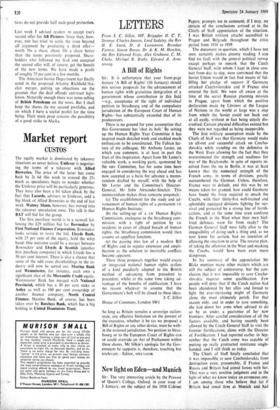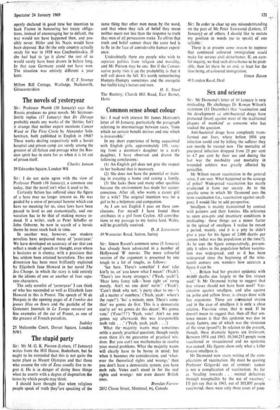New light on Eden—and Munich
Sir: The very interesting article by the Provost of Queen's College, Oxford, in your issue of 3 January, on the subject of the 1938 Cabinet Papers, prompts me to comment, if I may, on certain of the conclusions arrived at in the , Chiefs of Staff appreciation of the situation. I was British military attache accredited to Prague and Belgrade throughout the crisis period from 1936 to 1939.
The document in question, which I have not seen, certainly makes gloomy reading. I can find no fault with the general political survey except perhaps to remark that the Czech General Staff, with whom I kept in close con- tact from day to day, were convinced that the Soviet Union would in fact find means of ful- filling her pledge of support if Germany attacked Czechoslovakia and if France also entered the field. We were all aware at the time of the secret Russian planning mission in Prague, apart from which the positive declaration made by Litvinov at the League of Nations to the world at large was a step from. which the. Soviet could not back out at all easily, without in fact being utterly dis- credited. Certain physical difficulties existed but they were,not regarded as being insuperable.
The first military assumption made by the Chiefs of Staff was that Germany would make an all-out and successful attack on Czecho- slovakia while standing on the defensive. in the West. Even allowing for the fact that they overestimated the strength and readiness for war of the Reichswehr. in spite of reports re- ceived from the MA in Berlin, it was at least known that the numerical strength of the French army, in terms of divisions, greatly outnumbered the German. Unless, therefore, France were to default, and this was by no means taken for granted, how could Germany have found the force required to smash the Czechs, with their thirty-five well-trained and
_ splendidly equipped divisions fighting for sur- vival and protected by a strong line of fortifi- cations, and at the same time even confront the French in the West when their own Sief- fried defences were far from ready? The German General Staff were fully alive to the impossibility of doing such a thing and, as we now know for certain, had no intention, of allowing the situation to arise. The reverse plan, of taking the offensive in the West and masking the Czechs, would have been even more dangerous.
In his summary. of the appreciation Mr Blake mention many other matters which are still the subject of controversy, but the con- clusion that it was impossible to save Czecho- slovakia requires some qualification. Few People will deny that if the Czech nation had been abandoned by her allies and forced to fight the ever-increasing might of Germany alone she must ultimately perish. For that reason only, and in order to save something, she laid down her arms when advised to do so by us under a guarantee of her new frontiers. After careful consideration of all the factors available, and having recently been allowed by the Czech General Staff to visit the frontier fortifications, alone with the Director of Fortification, I had reported earlier in Sep- tember that the Czech army was capable of putting up really protracted resistance single- handed, and I still think so today. ,
The Chiefs of Staff finally concluded that it was impossible to save Czechoslovakia from destruction even, presumably, if. France and Russia and Britain had joined forces with her. That was a very positive judgment and in the light of what we know today an erroneous one. I am among those who believe that (a) if Britain had stood firm at Munich and had
openly declared in good time her intention to hack Fnce in honouring her treaty obiiga- tions, instead of encouraging her to default, the war would not have happened then, and pos- sibly never. Hitler and his Nazis would have been deposed. But (b) the only country actually ready for war in 1938 was Czechoslovakia. If she had had to `go it alone' the rest of us would surely have been drawn in before long. In that case Germany could not have won. The situation was entirely different a year later.
If.C.T. Stronge Milton Rill Cottage, Watledge, Nailsworth, Gloucestershire



































 Previous page
Previous page